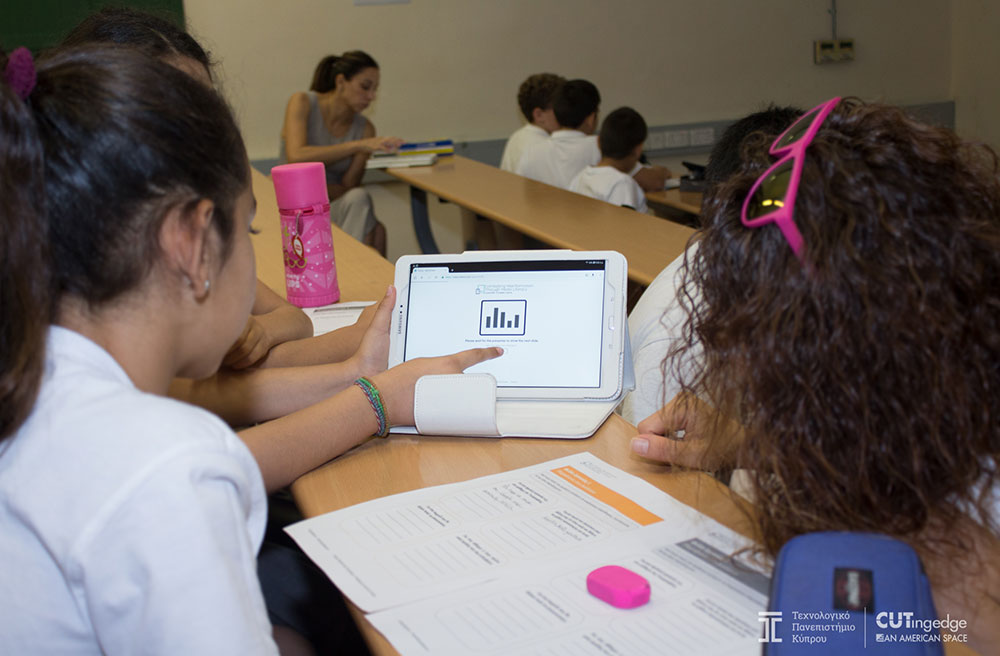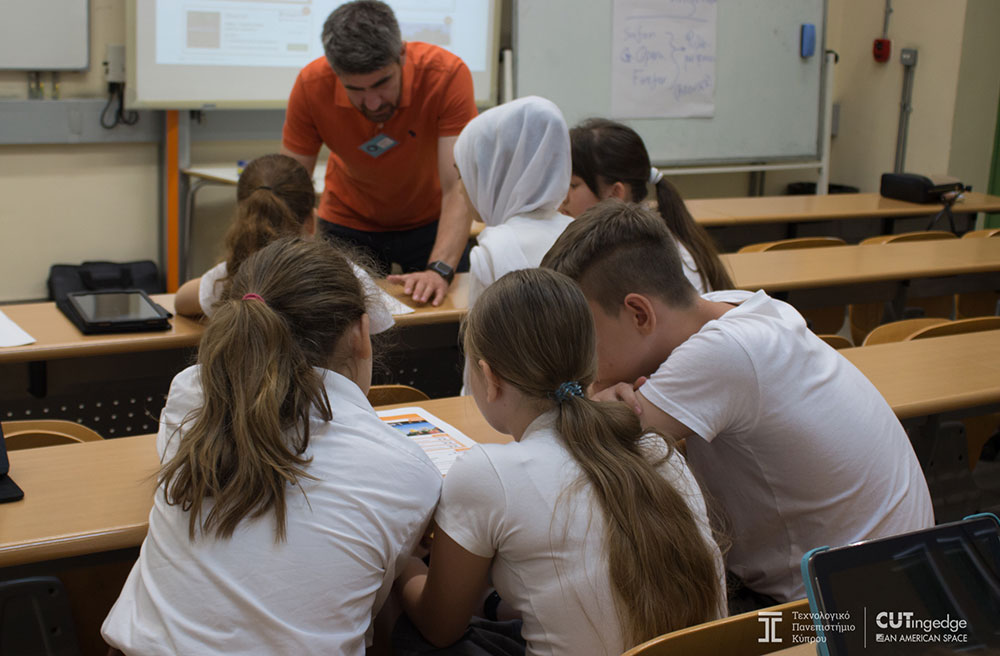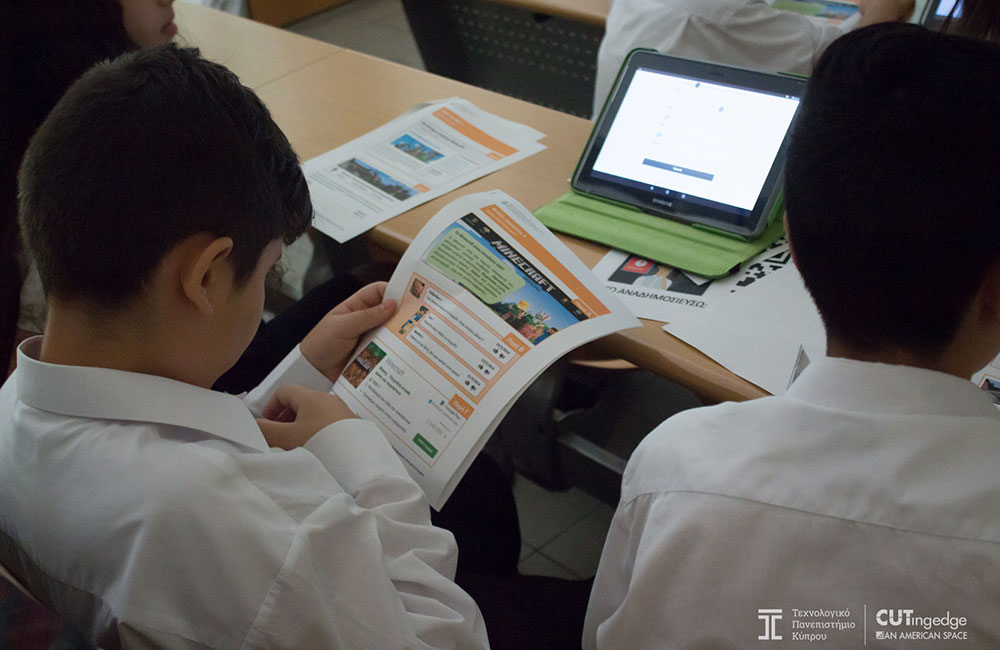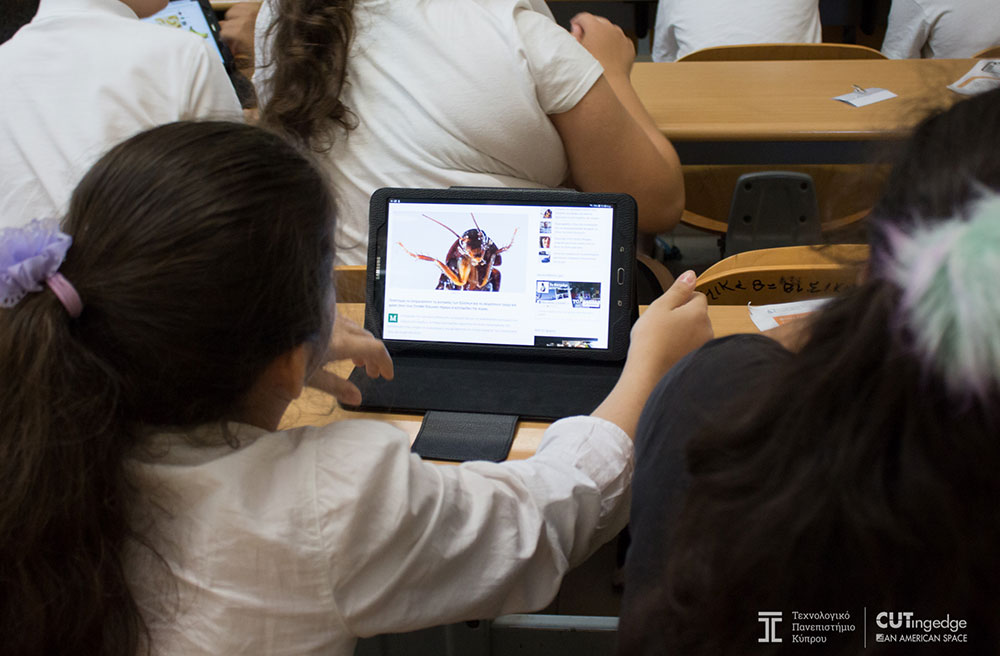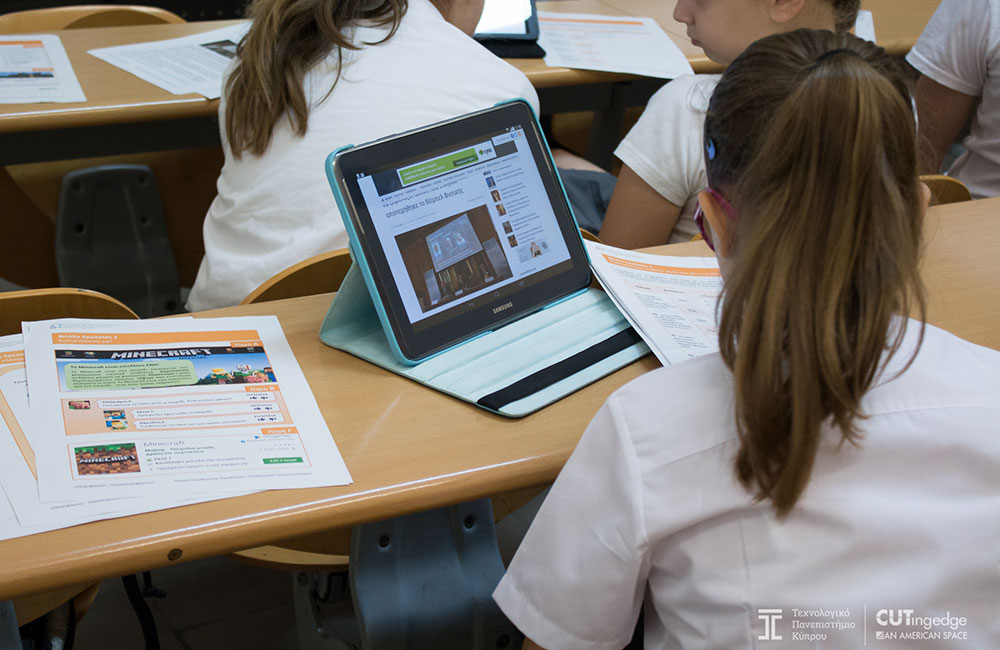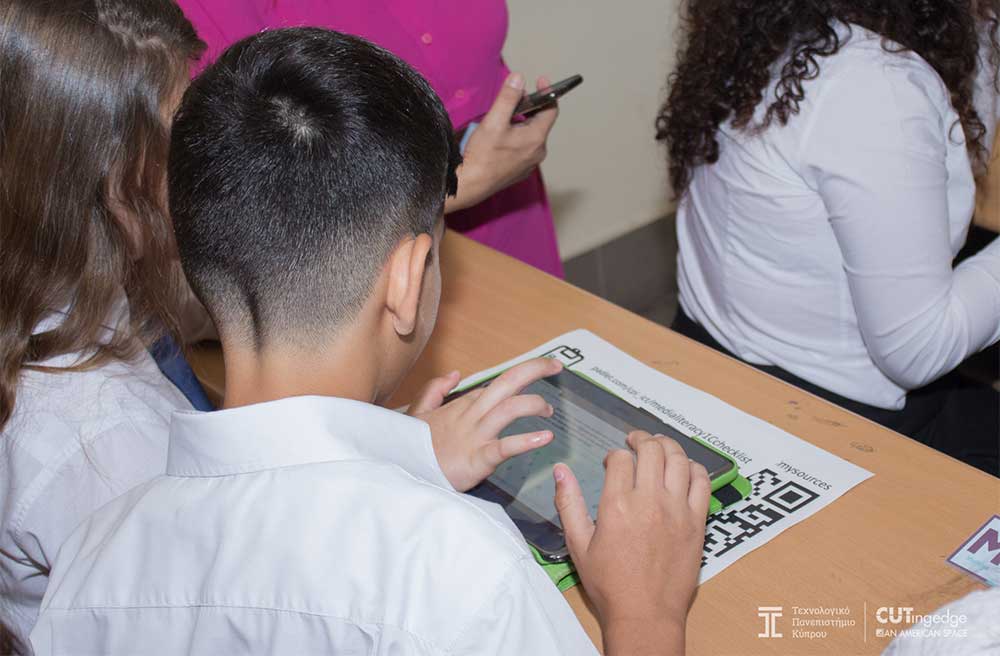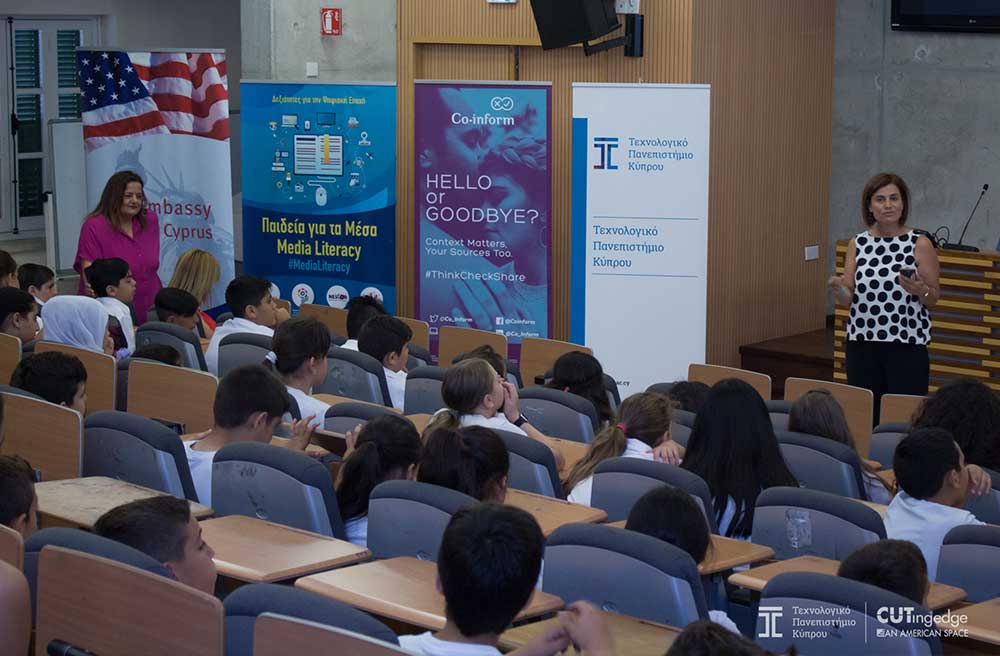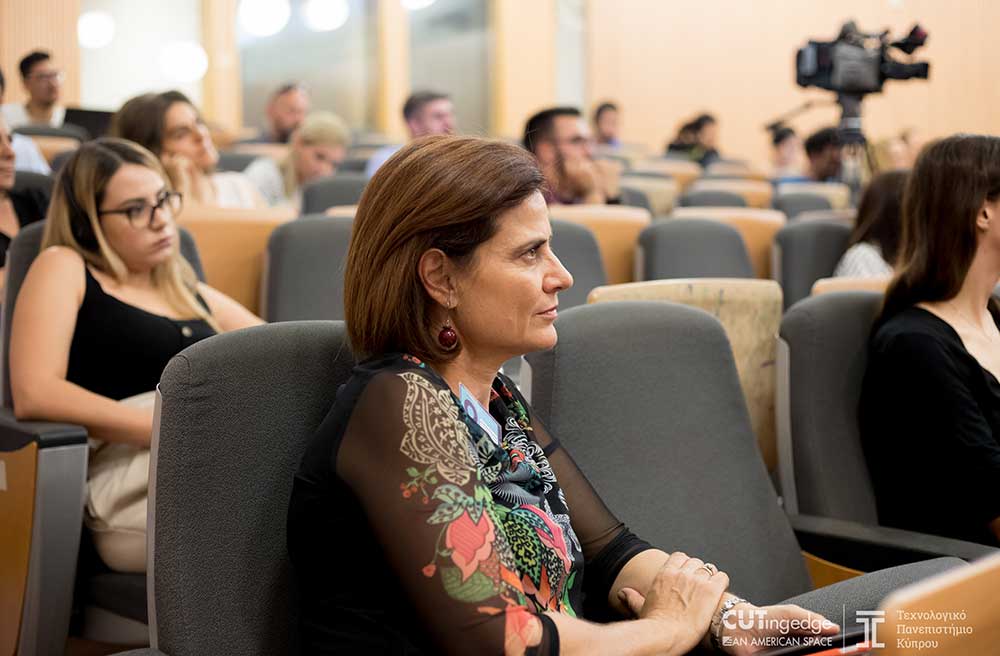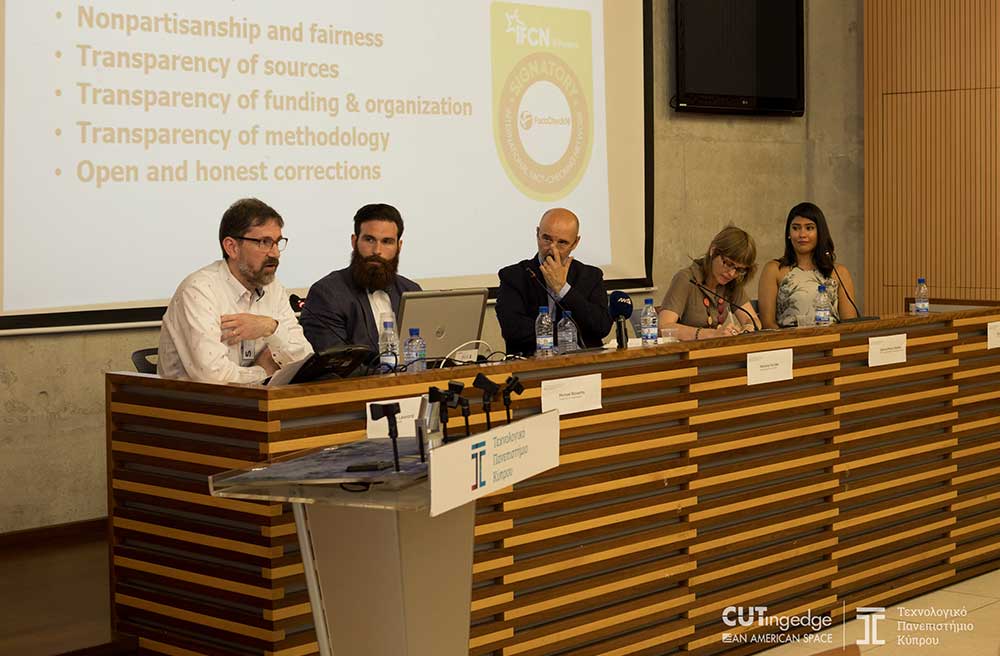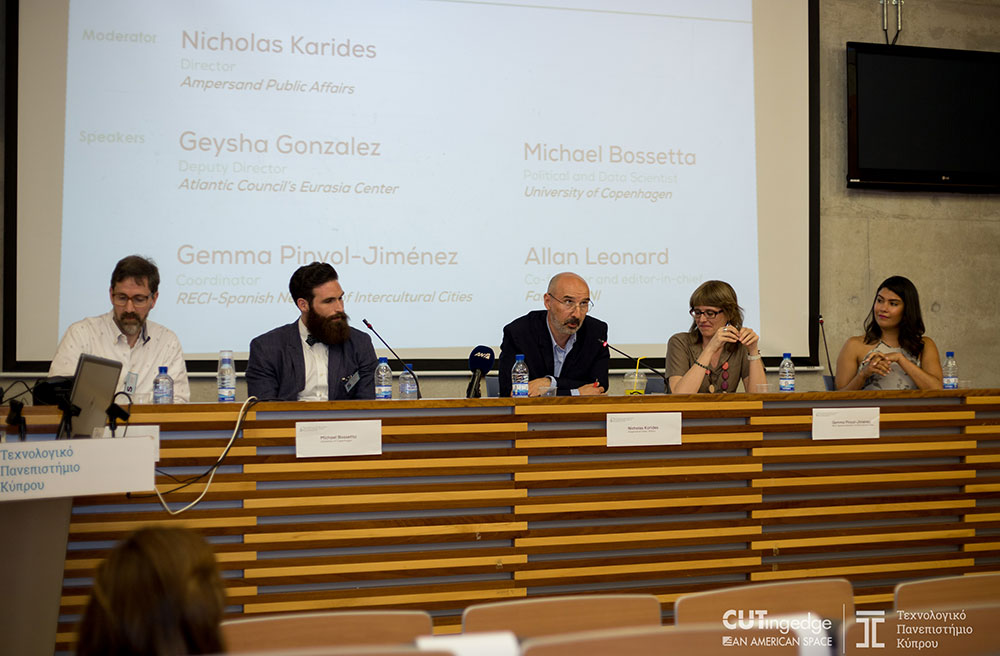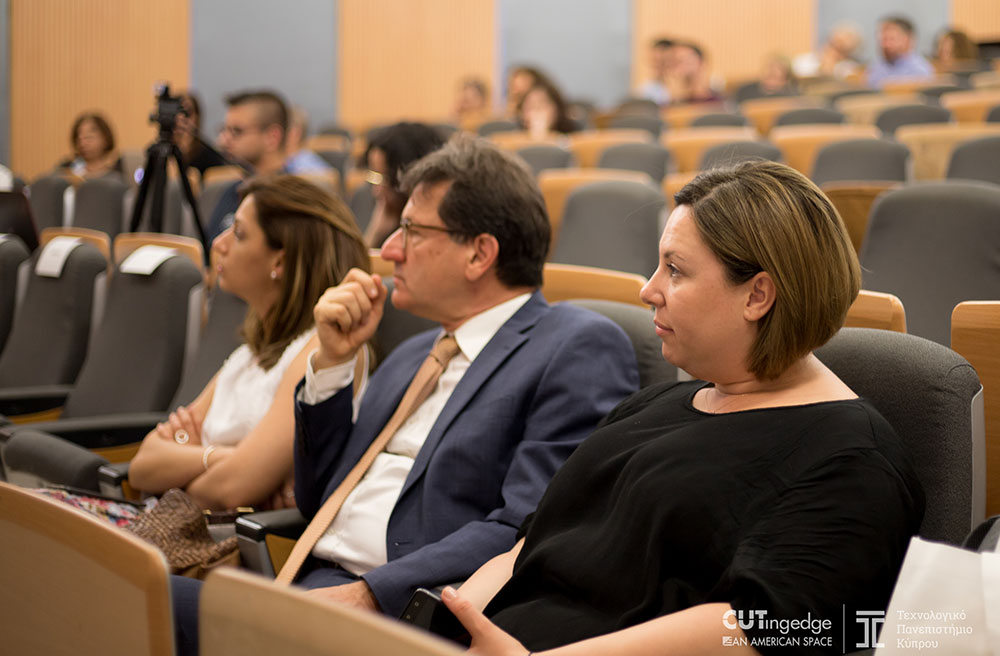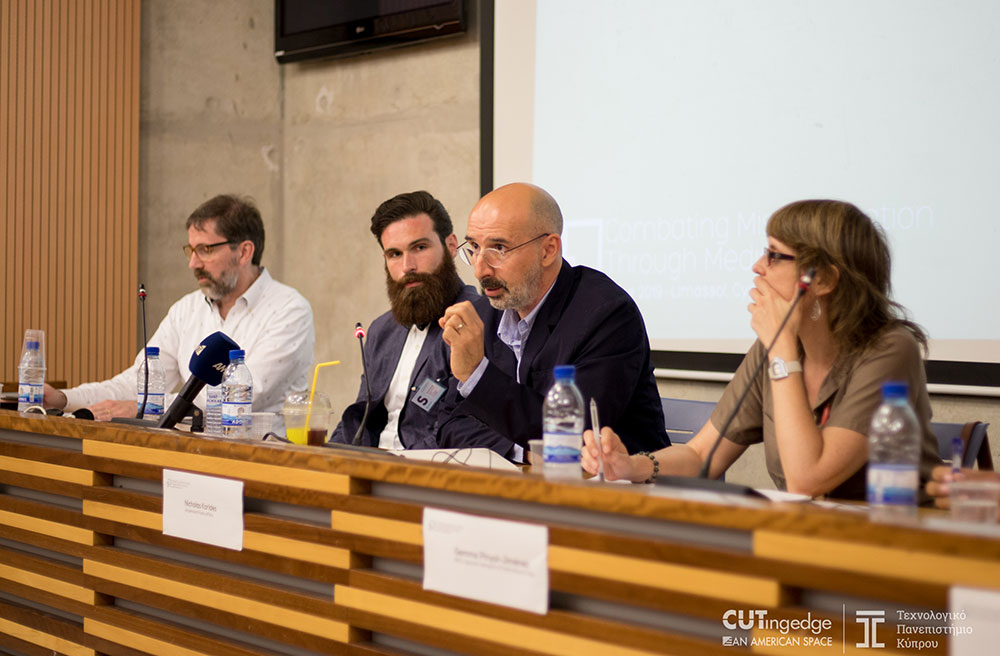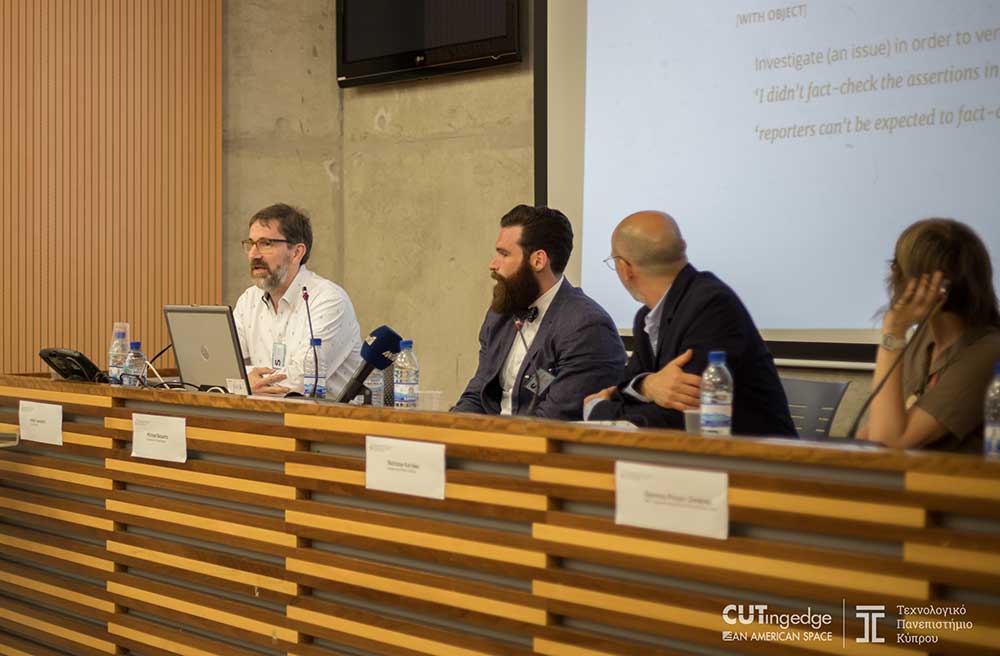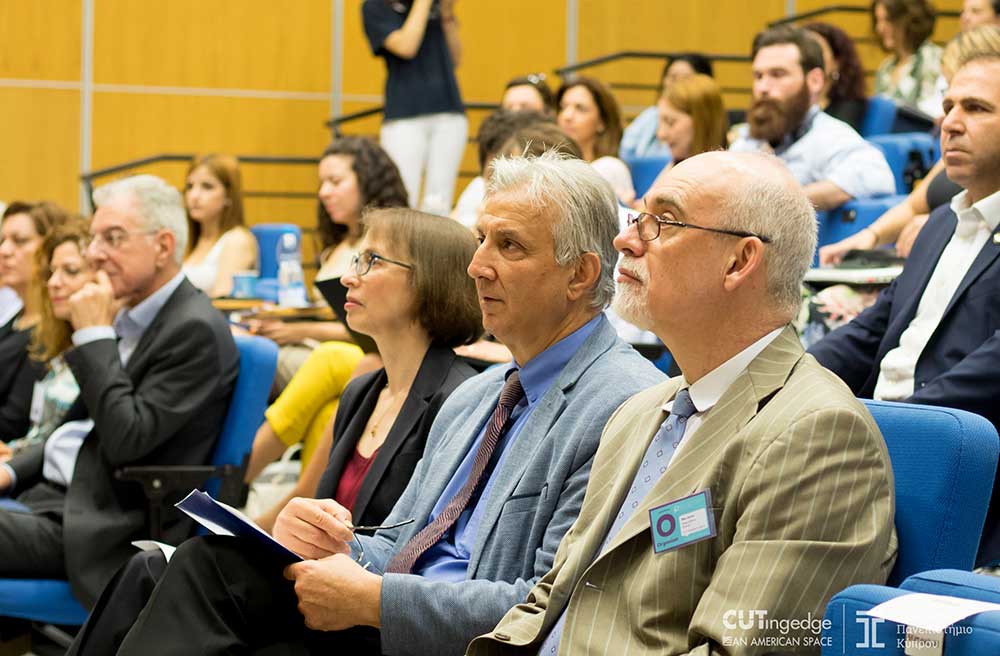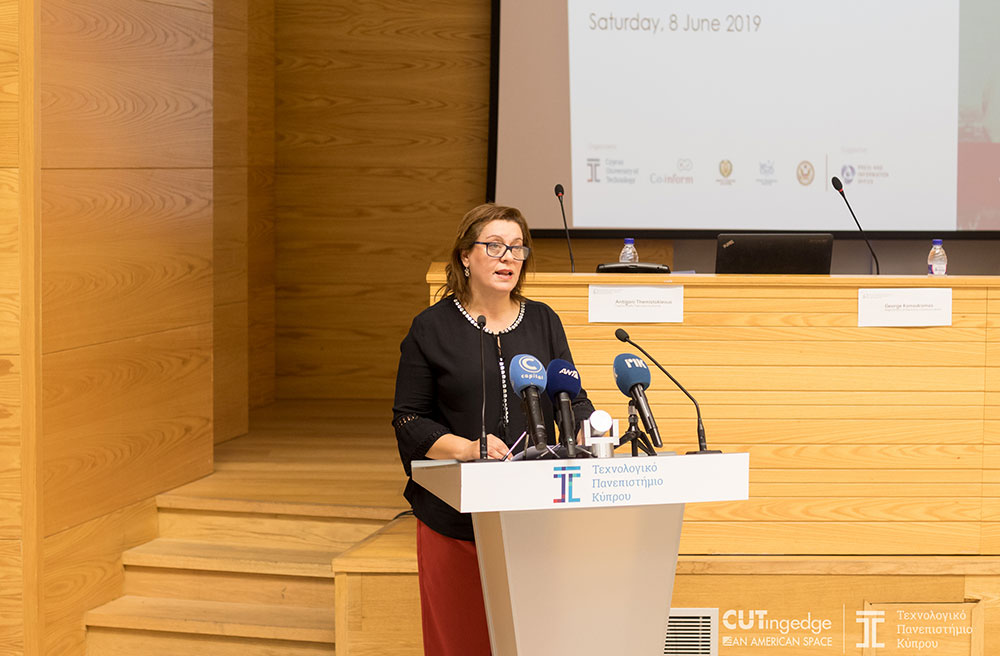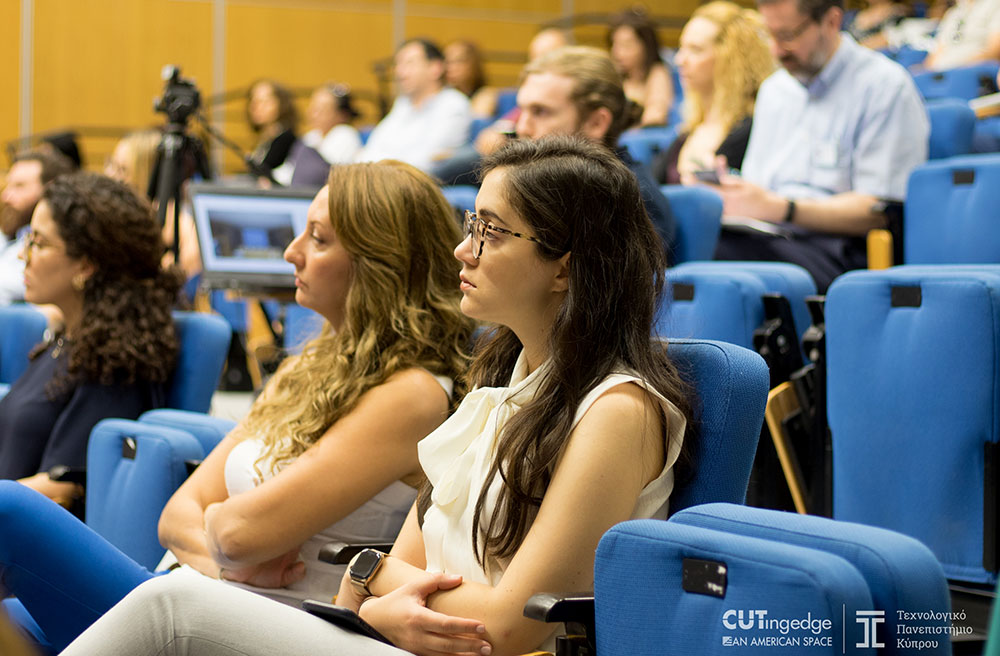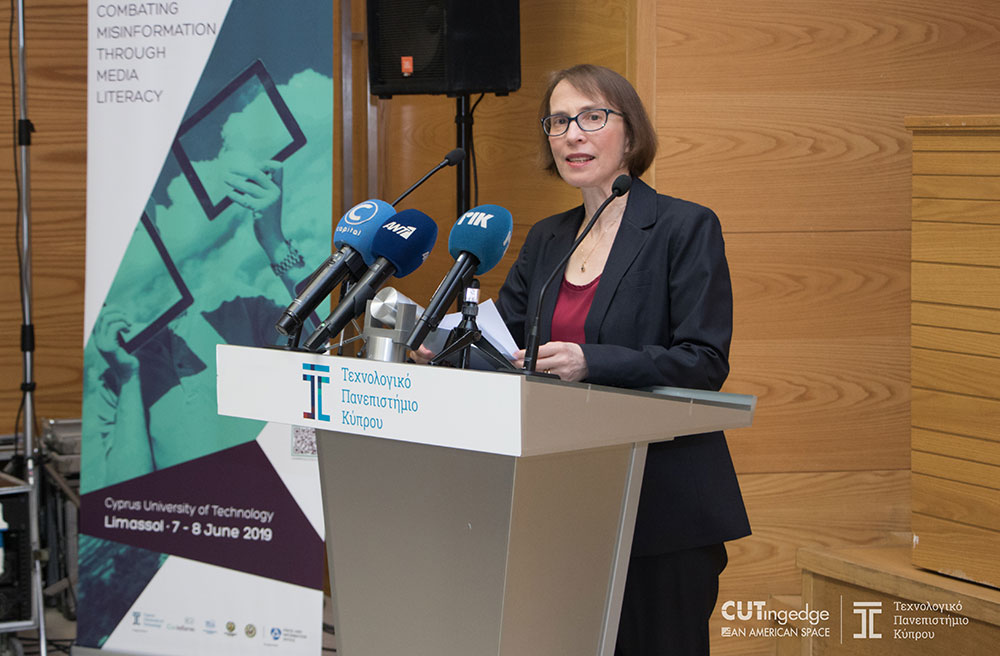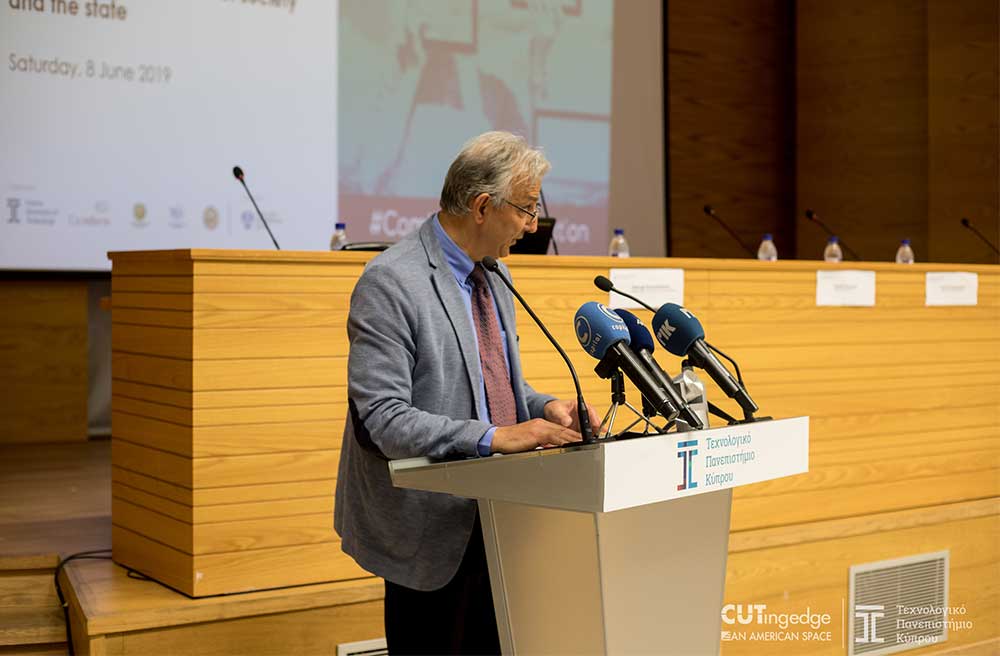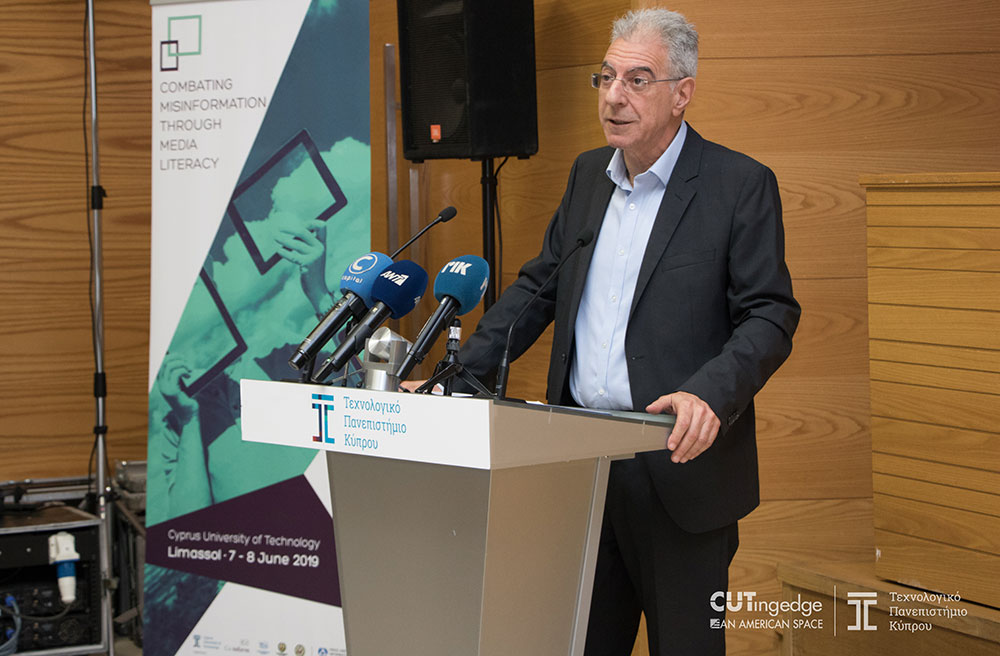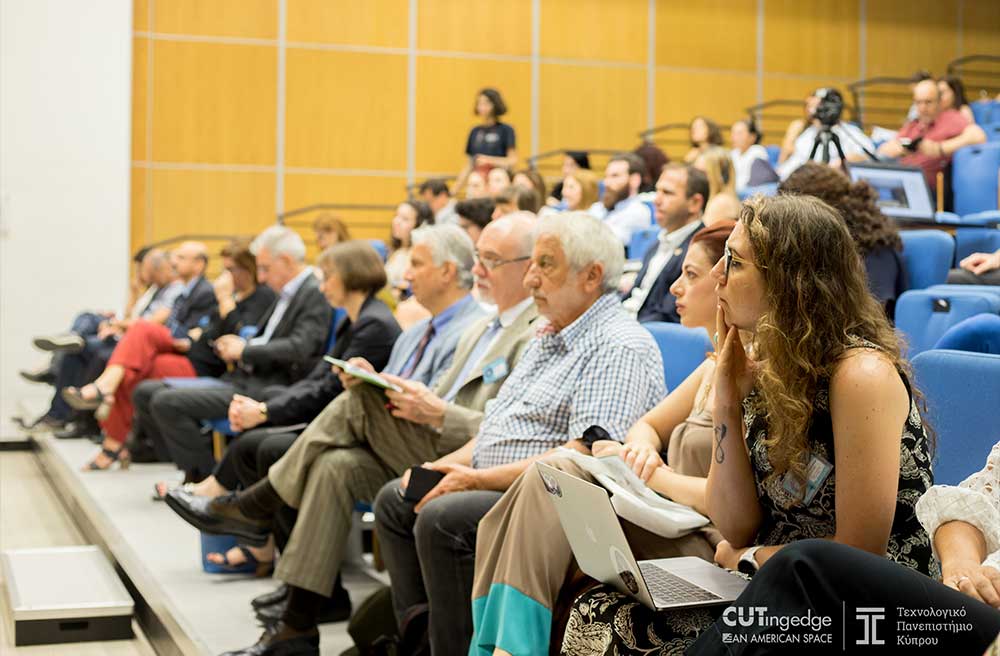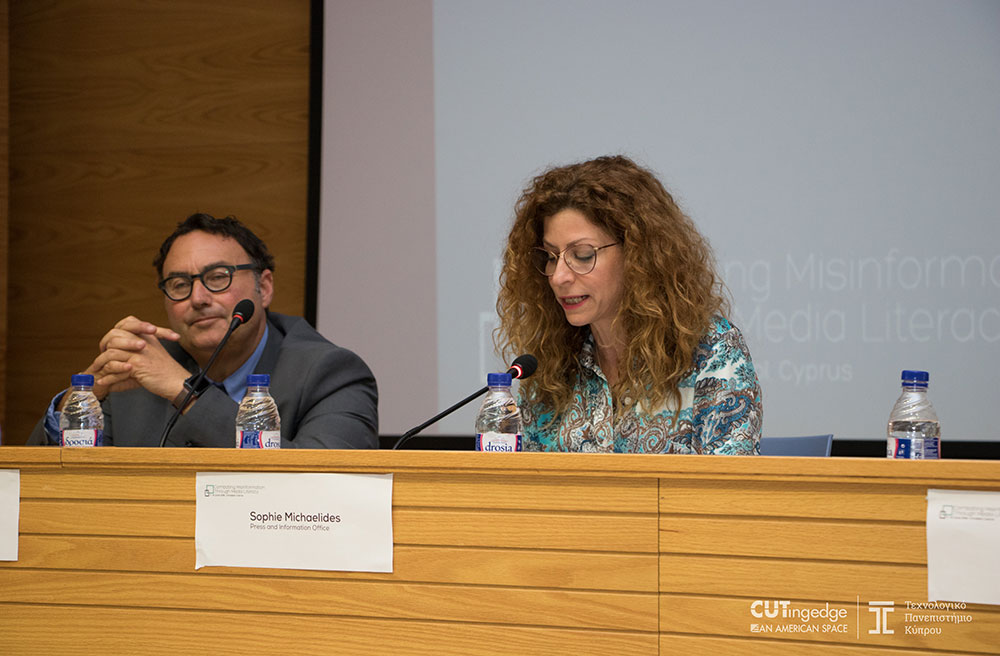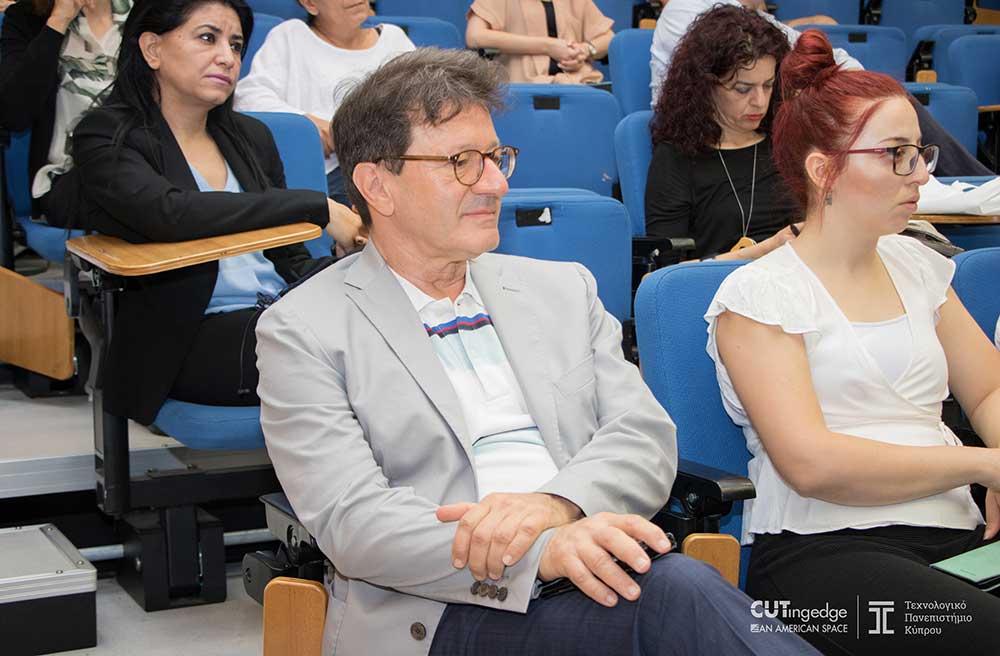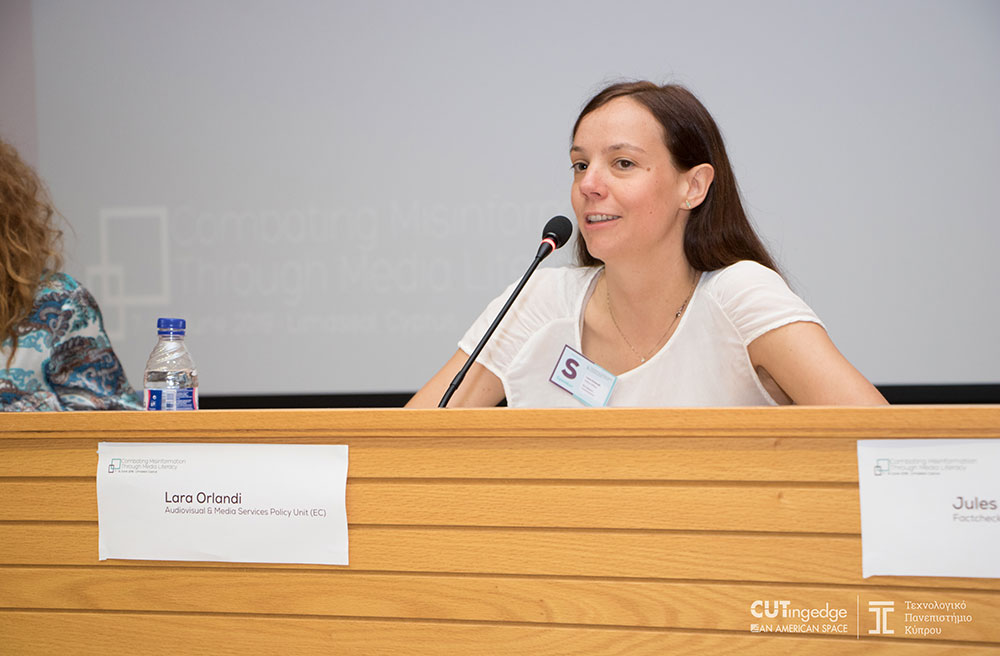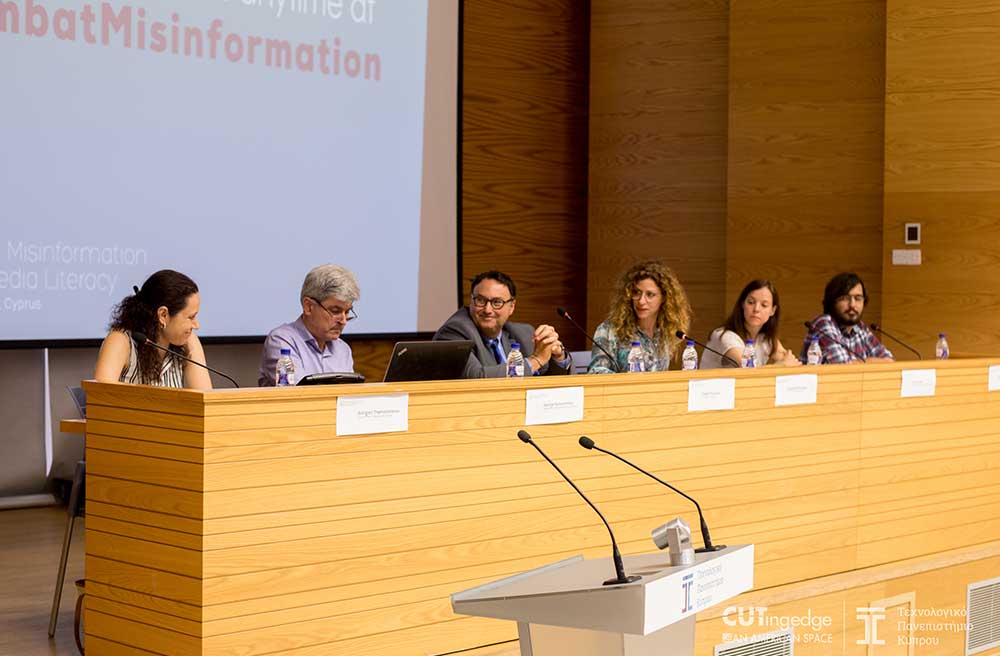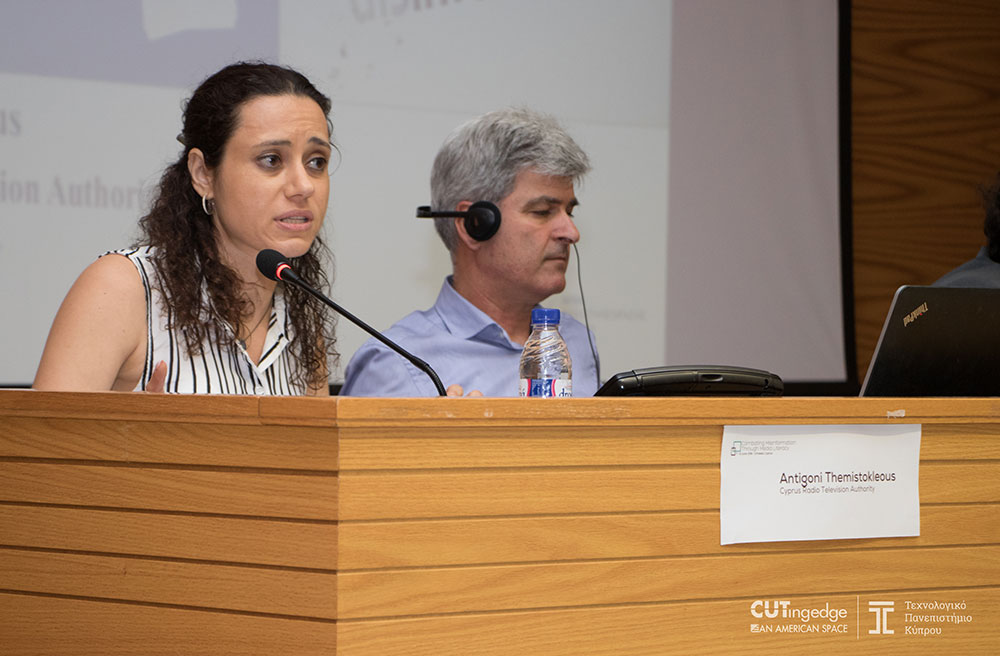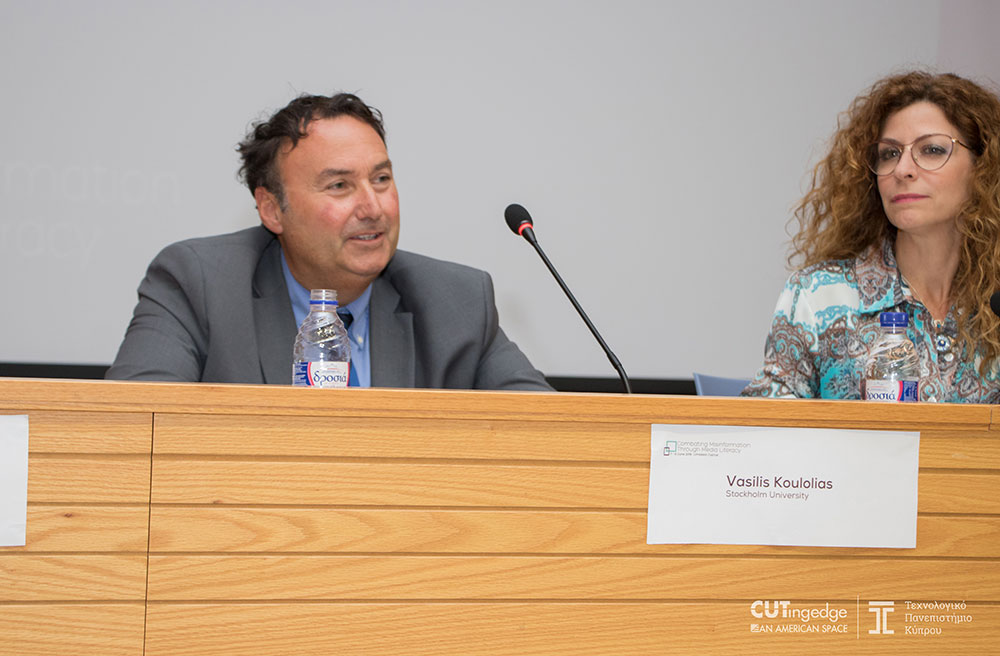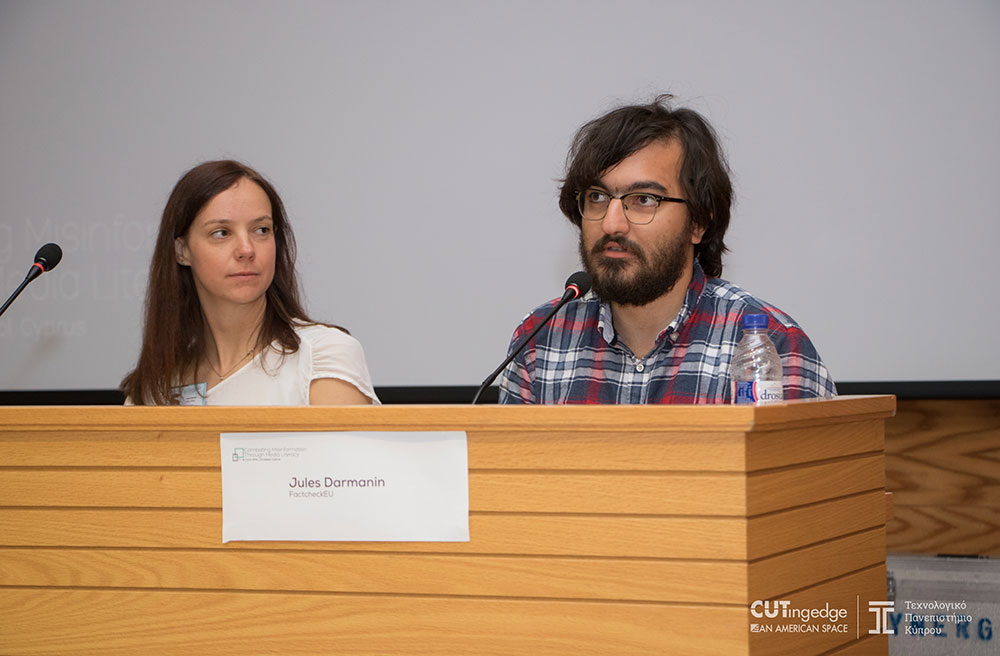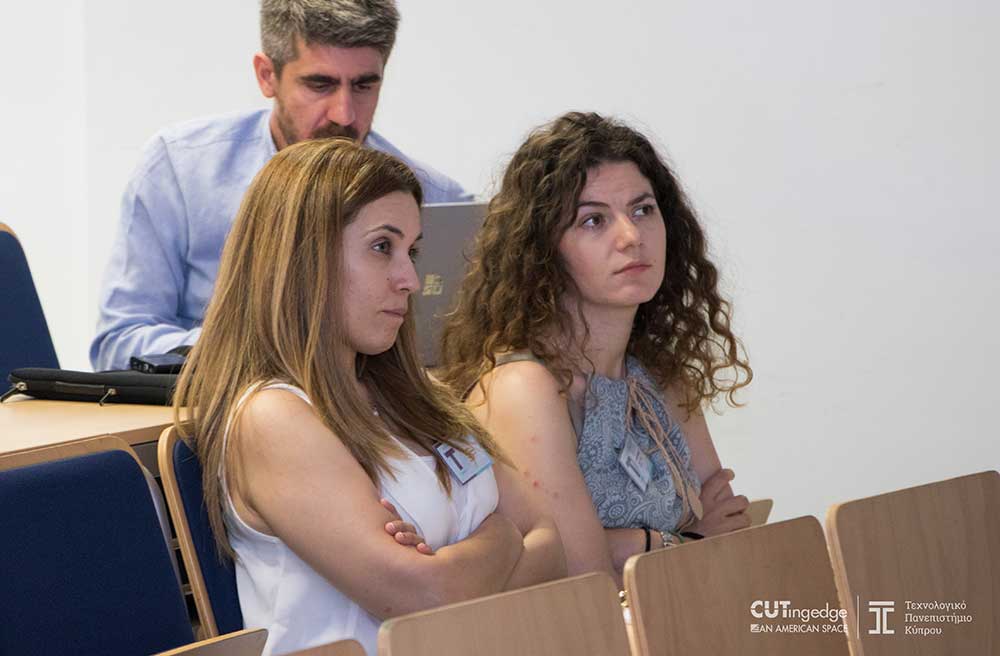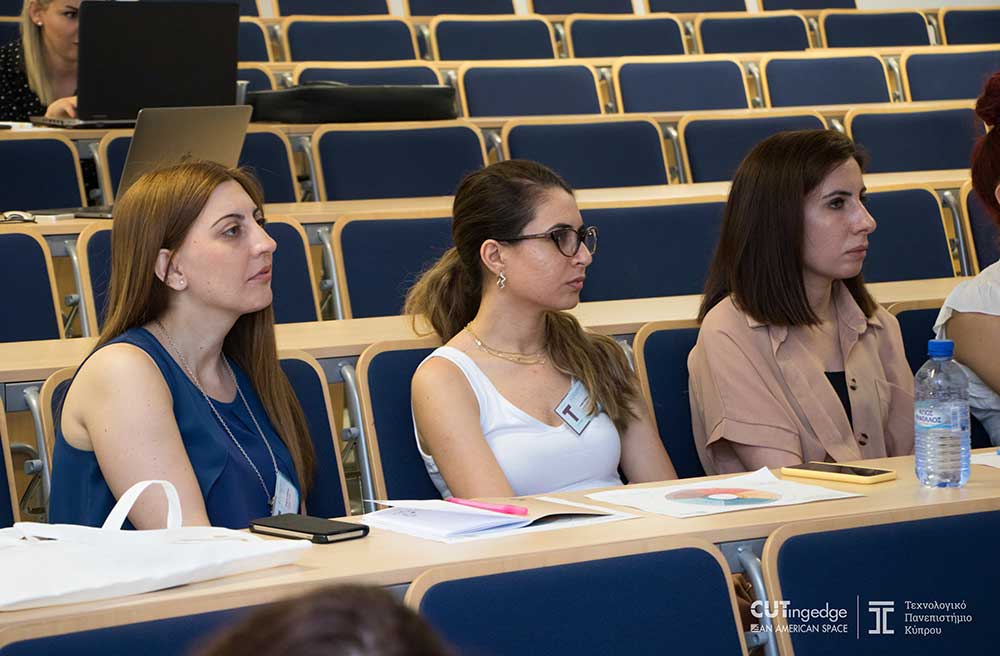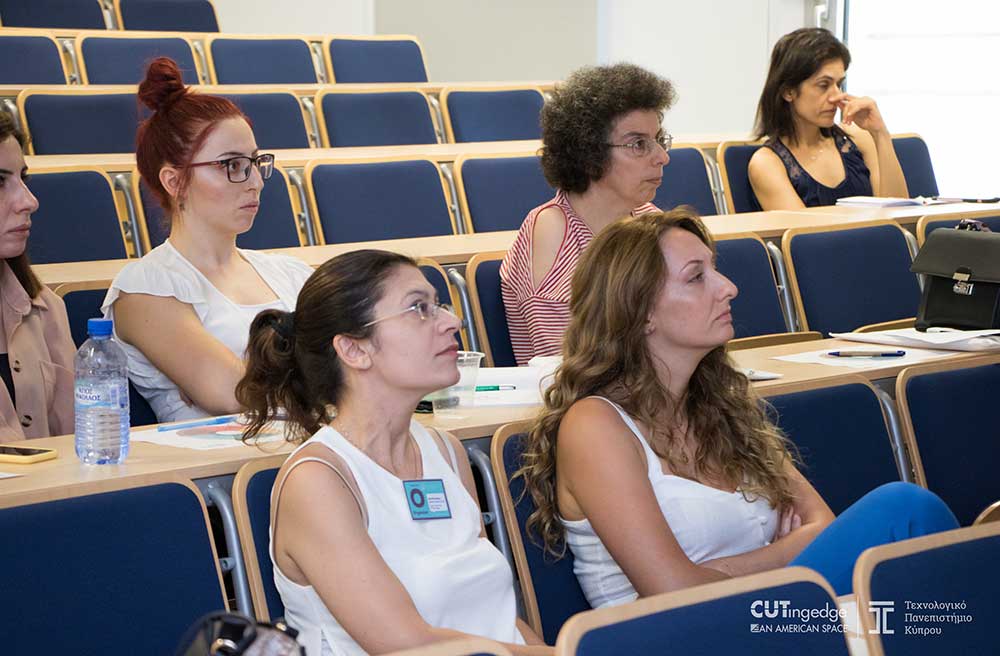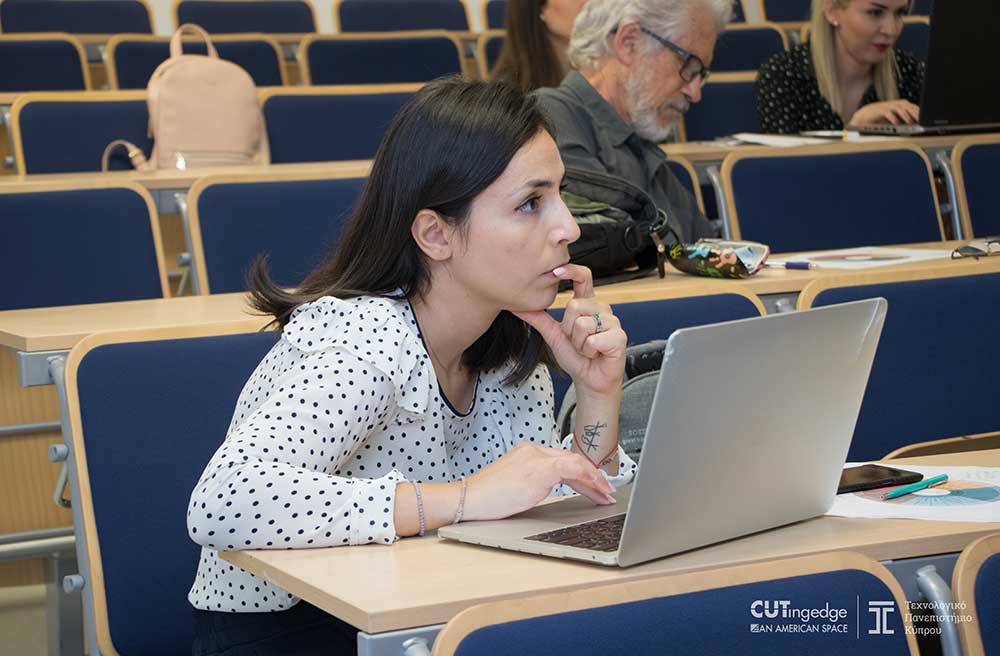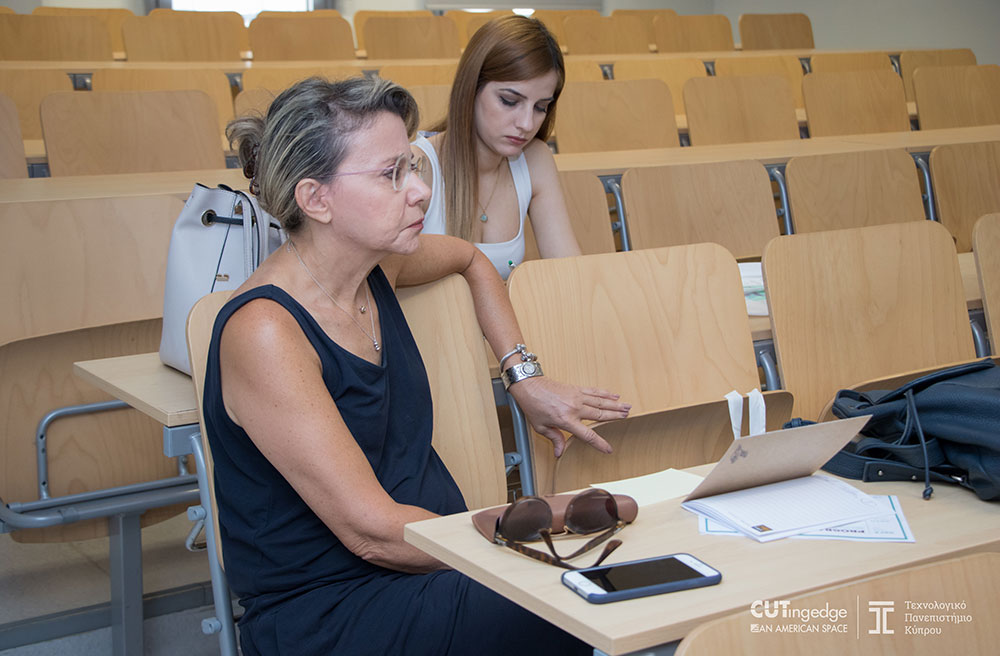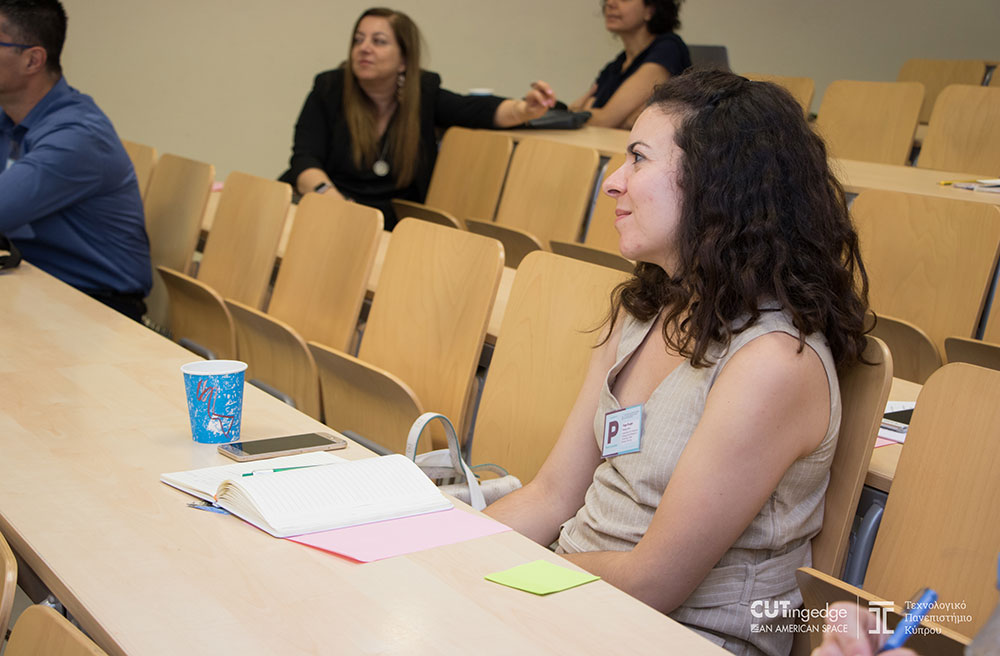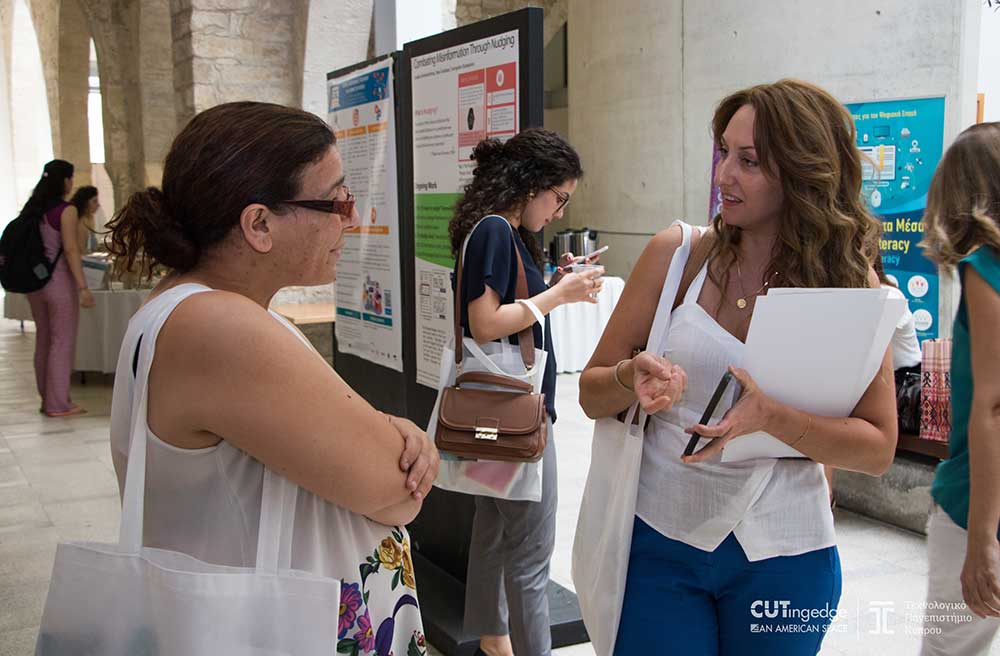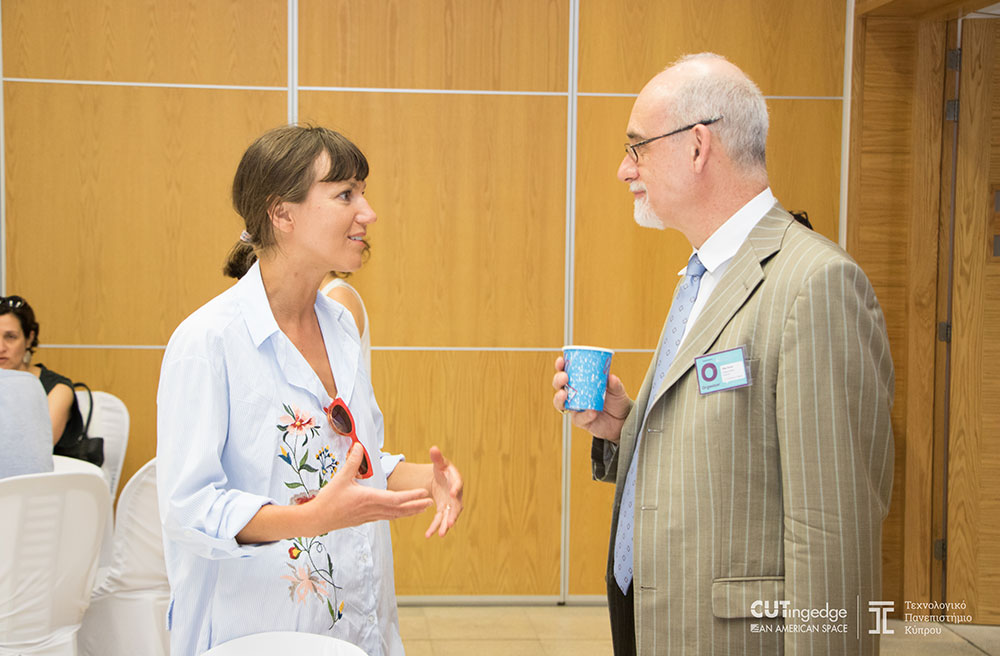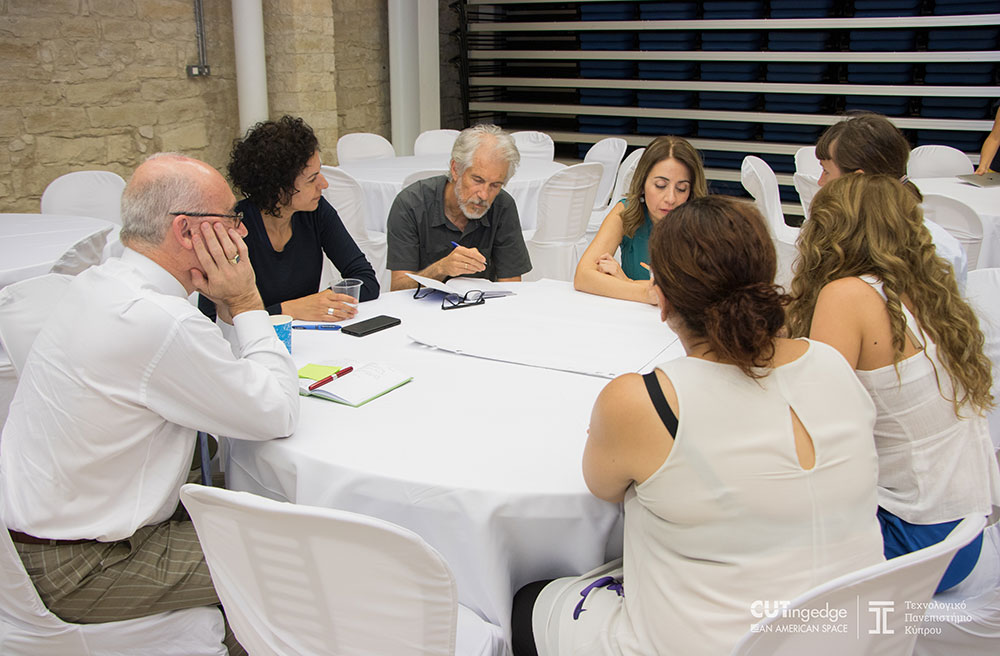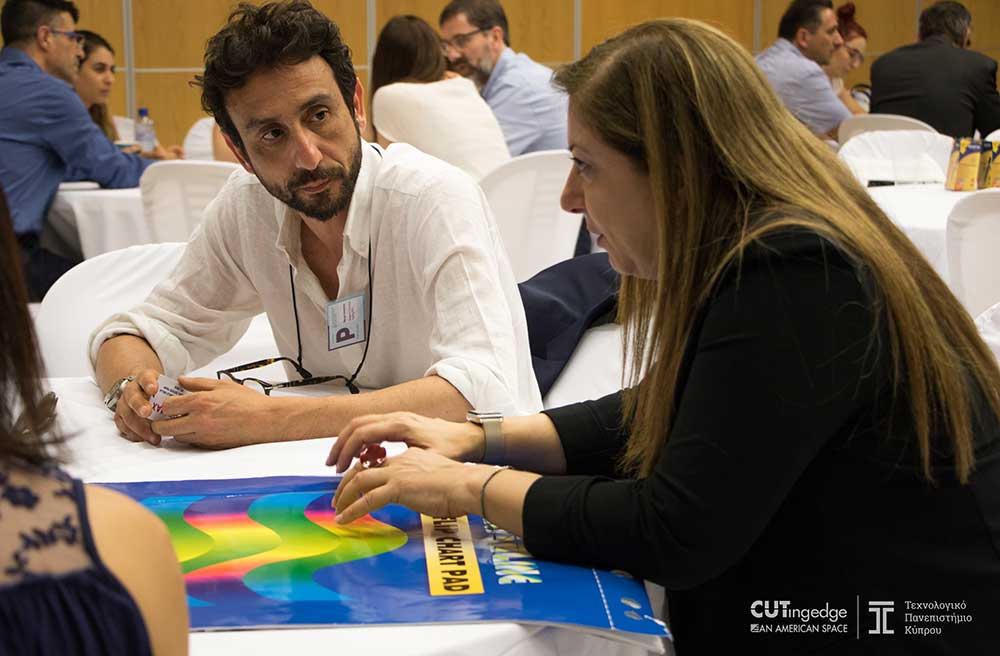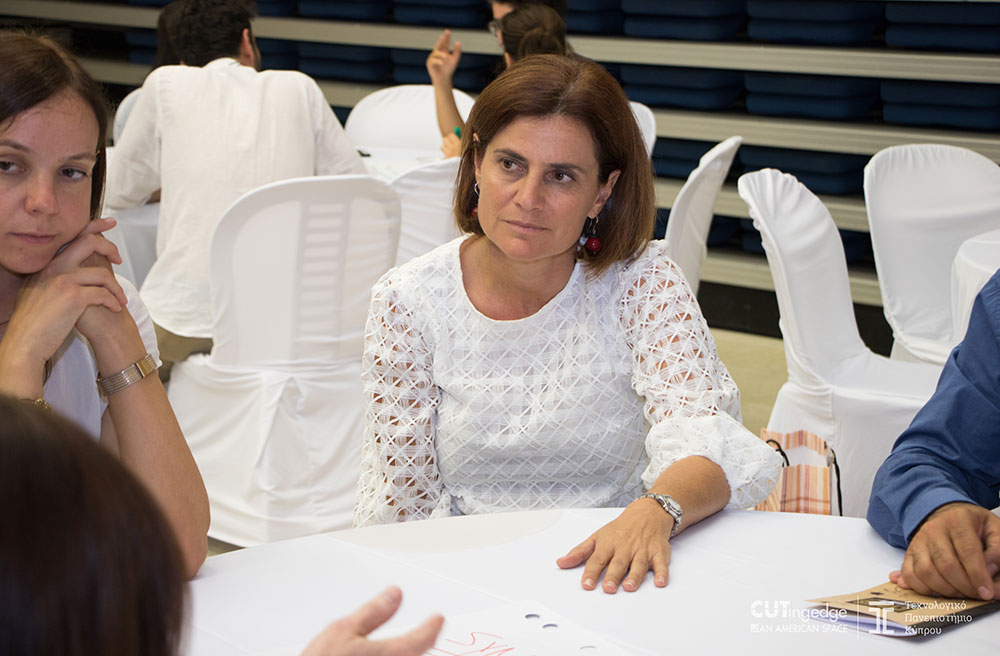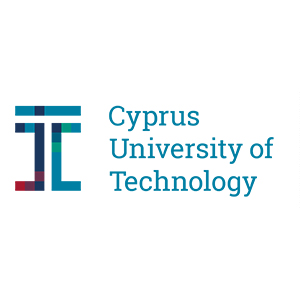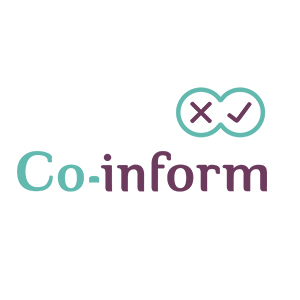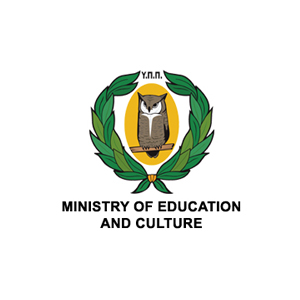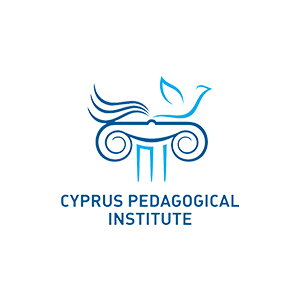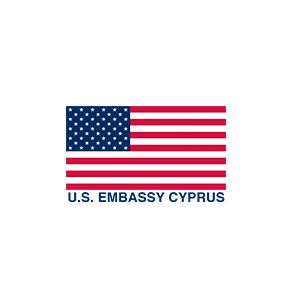The conference is open to all who wish to broaden their understanding on the topic of misinformation and ways to address it. Workshops will be organized for elementary school students, youth (ages 18-24), school teachers, journalists, fact-checkers, and policymakers. Spaces are offered on a first-come, first-served basis, and pre-registration is required. Participation is free of charge.

About | Participation | Registration | Details | Speakers | Organizers | Poster Contest | Call for Posters | Program
The “Combating Misinformation Through Media Literacy” conference has been successfully completed. Read the conference press release, view the photos from the conference, and watch the videos from the two public panel discussions held during the conference.
1. Panel Discussion 1 (Friday, June 7 2019): “What can we do as citizens to limit the spread of misinformation online?”
2. Panel Discussion 2 (Saturday, June 8 2019): “Combating misinformation through media literacy: The role of society and the state”.
The Cyprus University of Technology, the Horizon 2020 European project Co-Inform*, the Cyprus Pedagogical Institute of the Ministry of Education and Culture, and the U.S. Embassy in Cyprus are organizing a two-day, nationwide event on addressing misinformation through media literacy. The conference is supported by the Press and Information Office.
The conference, which will take place at the premises of the Cyprus University of Technology in Limassol, aims to raise awareness on the role of thinking about the media critically and will feature panel discussions with distinguished speakers that will be open to the public, interactive activities for students, and training workshops for teachers, journalists, the Youth, and policymakers.

*The Co-Inform project is co-funded by Horizon 2020 – the Framework Programme for Research and Innovation (2014-2020) | H2020-SC6-CO-CREATION-2016-2017 (CO-CREATION FOR GROWTH AND INCLUSION) | Type of action: RIA (Research and Innovation action) | Proposal number: 770302
Purpose
Nowadays, the spreading epidemic of misinformation as “alternative facts” poses major societal threats and risks that infiltrate every aspect of our life. Fake news and misleading narratives are challenges that require constant monitoring, supervision and it is high time we took steps to address this topic, raise awareness and provoke reflection and action on misinformation and media literacy issues.
Participation
The conference is open to all who wish to broaden their understanding on the topic of misinformation and ways to address it. Workshops will be organized for elementary school students, youth (ages 18-24), school teachers, journalists, fact-checkers, and policymakers. Spaces are offered on a first-come, first-served basis, and pre-registration is required. Participation is free of charge.
The students and teachers’ workshops will be conducted in Greek; workshops for journalists and policymakers, as well as panel discussions, will be conducted in English.
The role of journalists as guardians of the truth and media watchdogs is without question as important today as ever. But the rise of citizen journalism, amidst posts of bots and trolls, in the context of the dangerously oversimplified narrative inherent in the popularized term “fake news”, has diminished trust in news media outlets. We encourage journalists working across different media platforms, to register for this experiential workshop. By the end of this workshop, journalists will get acquainted with the best fact-checking practices using contemporary digital tools and will have the opportunity to connect with leading practitioners across Europe.
We invite journalists working across different media platforms to register.
Due to limited places (maximum number: 24), spaces are offered on a first-come, first served. The workshop will be conducted in English. The workshop will take place on Saturday, June 8, 2019. Participation is free but pre-registration is required.
Decision makers need access to accurate information in order to take informed decisions that impact the wider community. The contemporary media landscape mandates an online social media presence for policymakers today; while this democratizes online conversations with key decision makers, it also puts additional responsibility for every post and content shared. We invite policymakers across the island to participate in an experiential workshop that aims to provide them with tools and skills that can enable them to evaluate the trustworthiness of online information.
Due to limited places (maximum number: 24), spaces are offered on a first-come, first served. The workshop will take place on Saturday, June 8, 2019. Participation is free but pre-registration is required.
Misinformation is a problem that has garnered a lot of attention, and many are quick to argue that this problem needs to be addressed through education. However, the challenge for educators remains the same: How do you prepare students to navigate a digital world with many unknown challenges? UNESCO lists critical thinking and media literacy among the 21st century skills needed to ensure students are future-ready. Schools have an important role to play in media literacy actions, and this is why it is important to provide primary and secondary teachers with a set of tools and activities that can allow them to best deliver media literacy lessons that encourage students to reflect on their online behaviours, evaluate the trustworthiness of sources and understand how media messages are constructed for specific audiences.
We invite primary and secondary teachers to register for a workshop packed with hands-on activities that can be implemented with students of different ages. Due to limited places, spaces are offered on a first-come, first served. The workshop will be conducted in Greek.
The workshop will take place on Saturday, June 8, 2019. Participation is free but pre-registration is required.
What if the very tools that were being used to spread misinformation, could also be used to raise awareness? Today, everyone can be a producer of media content, and none more so than the youth, who are active on a range of social media platforms, are well-versed in digital media and are keen to make their voices heard.
During a two-day workshop, university students will explore the problem of misinformation by taking on a media producers’ role. By creating a social awareness campaign video, students will learn about the media production process, and will get to share a meaningful message through their own short films.
The workshop is open to all youth, ages 18-24, preferably with some background in media, design, production or communication in general. Due to limited places (maximum number: 18), spaces are offered on a first-come, first served. The workshop will be conducted in Greek.
The workshop will take place on Friday and Saturday, June 7 & 8, 2019. Participation is free but pre-registration is required.
Dubbed as digital natives, students today have grown up in a world where the internet has always existed. Developing critical thinking through media literacy is one of the most important approaches in facilitating active, informed online users who will lead the way to a democratic digital future.
In a world where online platforms mediate most of the information access, it is important that all students approach online information critically. This workshop aims to bring out the information detective in every student. Through fun and interactive activities, students will engage with different information sources and through teamwork and discussion determine how to read media messages, who to trust, and how they can make an impact online by creating positive online content.
The workshop will take place on Friday, 7 June 2019. The elementary school students have already been invited to participate
Register for the “Combating Misinformation Through Media Literacy” Conference.
Registration for the conference is free.
For questions, please contact us.
Conference Details
Where: Cyprus University of Technology · View map (Day 1) · View map (Day 2)
When: 7 – 8 June 2019
Friday, June 7
The first day of the conference will kick off with Media Literacy activities for elementary school students and youth (ages 18-24), followed by an international panel discussion in the afternoon titled: “What can we do as citizens to limit the spread of misinformation online?”.
Saturday, June 8
Day two begins with a panel discussion with international and local participants on the topic of addressing misinformation through media literacy. The panel will be followed by experiential workshops for teachers, journalists, policymakers, and youth (ages 18-24) which will focus on addressing online misinformation. Posters from different projects working on misinformation will also be featured.
Panel Discussion, Friday, 7 June 2019, 18:00 – 19:30
Pefkios Georgiades Amphitheatre, Andreas Themistocleous Building, Cyprus University of Technology, Limassol
The panel discussion is open to the public!
Title: What can we do as citizens to limit the spread of misinformation online?
Moderator: Mr Nicholas Karides
Speakers: Ms Geysha Gonzalez, Ms Gemma Pinyol-Jiménez, Dr Michael Bossetta, Mr Allan Leonard
Short Bios

Nicholas Karides, Director, Ampersand Public Affairs
Mr Nicholas Karides was born in London. He went to school in Cyprus and studied at Penn State University in the United States and Middlesex Polytechnic and the London School of Journalism in Britain. After a brief spell as a journalist in London he served as Head of the Press Section and spokesman of the Delegation of the European Commission in Nicosia. He resigned from the Commission when Cyprus joined the European Union and set up Ampersand Public Affairs. He was among the founders and contributing editors of the award-winning news outlet Offsite and is the author of Knowing One’s Place (2018), a collection of essays on journalism, diplomacy and football.

Geysha Gonzalez, Deputy Director, Atlantic Council’s Eurasia Center
Ms Geysha Gonzalez is the deputy director of the Atlantic Council’s Eurasia Center. She’s also the founder of DisinfoPortal.org, an online guide tracking effort to counter disinformation. Prior to joining the Council, she spent two years at Freedom House, a human rights and democracy watchdog, working in various roles including as a member for the Freedom of Expression team, where she worked on issues related to digital and physical security for human rights defenders.

Michael Bossetta, Political and Data Scientist, University of Copenhagen
Dr Michael Bossetta is a Political and Data Scientist at the University of Copenhagen. He specializes in the impact of social media on politics. He produces and hosts the Social Media and Politics Podcast, an interview-driven podcast aiming to disseminate research findings to the public. The show has over 60,000 downloads from 142 countries.

Gemma Pinyol-Jiménez, RECI-Spanish Network of Intercultural Cities Coordinator
Gemma Pinyol-Jiménez is the coordinator at RECI-Spanish Network of Intercultural Cities and expert for the Intercultural Cities project of the Council of Europe. She has been involved in the Anti-Rumors Strategy via RECI and the C4i project funded by the European Commission and the Council of Eupore. The Antirumours Strategy was launched in 2013 as an innovative city strategy to promote change on perceptions, attitudes and behaviours that combine local public commitment and policies and social and citizens’ actions. The initiative, that today’s is fully working in several RECI cities, ICC cities around Europe and abroad, is a long-term process of social change to prevent discrimination, promote inclusion and positive interaction and make the most of diversity.

Allan Leonard, Co-founder and editor-in-chief, FactCheckNI
Mr Allan Leonard is co-founder and editor-in-chief at FactCheckNI. He is a peace journalist and editor-in-chief of Shared Future News, which reports on peacebuilding in Northern Ireland. He served as managing director at the Northern Ireland Foundation, an independent charity established to promote peace and reconciliation, where he also gained international experience supporting programmes in other divided societies. His professional background includes project and staff management, fundraising, marketing and communication.
Panel Discussion, Saturday, 8 June 2019, 9:30 – 11:30
Amphitheatre 1, Tassos Papadopoulos Building, Cyprus University of Technology, Limassol
The panel discussion is open to the public!
Title: Combating misinformation through media literacy: The role of society and the state
Moderator: Ms Sophie A. Michaelides
Speakers: Ms Lara Orlandi, Mr George Komodromos, Dr Antigoni Themistokleous, Dr Vasilis Koulolias, Mr Jules Darmanin
Short Bios

Sophie A. Michaelides, Director, Press and Information Office
Ms Sophie A. Michaelides studied Rhetoric and Communication at the State University of New York (USA) and Mass Media in Political Communication in Sorbonne in Paris (France). She speaks Greek, French, Italian and English. She worked in large commercial organizations, a leading publishing house and a major communication technology giant. She has provided professional services to advertising, television and audiovisual production companies. Her vast political involvement includes serving as Political Communication Director and Electoral Campaign Manager. The broad mixture of experience and expertise, together with the close media relations she has developed, have enriched her strategic approach, crisis handling, hands- on project management, time and human resource management, teamwork and participation sense, creativity, as well as strong interventional opinion. Her latest appointment as the Government’s Press and Information Office Director, provides Ms Michaelides the challenge of participating in the Nation’s strategic communication policy creation, Media Law and Regulation formation and monitoring, the strategy of information flow and the promotion of the Government’s image, activities and achievements, through media, diplomacy and Institutions.

Lara Orlandi, Policy Officer, DG CONNECT, Audiovisual & Media Services Policy Unit, European Commission
Ms. Orlandi has studied languages, law and European Studies at the University of Vienna and at KU Leuven in Belgium. She has over 9 years of work experience in EU affairs, with a focus on EU digital policy and media law. Currently she works as a Policy Officer on the Audiovisual Media Services Directive, on issues relating to media freedom and media literacy in the Directorate-General for Communications Networks, Content and Technology. Apart from her native German and Italian, Lara is also fluent in English and French.

George Komodromos, Director, Department of Electronic Communications, Government of Cyprus
Mr George Komodromos is the Director of the Department of Electronic Communications of the Ministry of Transports, Communications and Works, where he is responsible for formulating and monitoring the implementation of the national digital strategy, the national space strategy, as well as for the regulation of the use of radio spectrum. Mr. Komodromos has worked for the Department for nearly two decades representing the electronic communications interests of the Cyprus Government internationally.
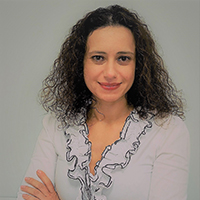
Antigoni Themistokleous, Officer, Cyprus Radio Television Authority
Dr Antigoni Themistokleous studied Media and Communications Regulation and Policy at the LSE (UK), after her graduate studies in Classics. She then completed her Ph.D. at the University of Brighton (UK). She has been working at the Cyprus Radio Television Authority for 12 years. She coordinates the Authority’s Media Literacy policy and projects and works on monitoring the broadcast content. She has collaborated with the European Audiovisual Observatory in undertaking a comparative research on media literacy, titled “Mapping of media literacy practices and actions in EU-28” (2015) commissioned by the European Commission. Her research interests focus on communications policy and governance, media regulation and ethics, including issues of diversity, pluralism, and media freedom and the use of language in the media.

Vasilis Koulolias, Stockholm University, Executive Director, eGovlab
Dr. Vasilis Koulolias is the Executive Director of eGovlab and the coordinator of the Co-Inform project. He is a technologist, economist and political scientist (International Relations) and has dedicated over two decades in bringing the benefits of ICT to popular democratic proceedings while bridging the gap between citizens and policy makers. He works with nearly all member states in Europe, sub-Saharan Africa and Southeast Asia, participating in key European and Swedish initiatives for public service transformation through co-creation. He has expertise in the coordination of EU-funded projects within several programmes (EDF, FP7, CIP‐ICT‐PSP), business process management, advising and assisting governments to modernize their legislative processes, and enabling citizens to exercise their rights to democratic participation, as well as on research on citizen participation, the internet and politics.

Jules Darmanin, Reporter, FactcheckEU Project Coordinator
Mr Jules Darmanin, based in Paris, online since forever, he writes and investigates on various topics, making the most of social media and online resources. He published several investigations while covering social news on a daily basis. He is specializing in online investigations (OSINT), debunking, social news and online culture. He works in French and English. He also teaches debunking and online investigative techniques at the journalism school of Sciences Po in France.
Organizers
Conference Chairs
-
Eleni Kyza, Cyprus University of Technology
-
Anastasia Economou, Pedagogical Institute of Cyprus
Conference organizing committee
-
Andria Agesilaou, Cyprus University of Technology
-
Spyros Charitou, U.S. Embassy in Cyprus
-
Glen Davis, U.S. Embassy in Cyprus
-
Panayiota Hadjittofi, Pedagogical Institute of Cyprus
-
Theodora Kakouri, Pedagogical Institute of Cyprus
-
Nicolas Kanaris, Pedagogical Institute of Cyprus
-
Melina Karageorgiou, Cyprus University of Technology
-
Evangelos Karapanos, Cyprus University of Technology
-
Loukas Konstantinou, Cyprus University of Technology
-
Iolie Nicolaidou, Cyprus University of Technology
-
Dionysis Panos, Cyprus University of Technology
-
Christos Roushias, Pedagogical Institute of Cyprus
-
Markos Souropetsis, Cyprus University of Technology
-
Anna Tsiarta, Pedagogical Institute of Cyprus
-
Christiana Varda, Cyprus University of Technology
Student Contest: “Create against misinformation”
Multimedia Poster Student Contest
This action aims to bring out students’ creativity in the field of digital design and art, and urges them to engage with the issue of misinformation, which occurs on the social networks and the mass media in general, so they can move past being passive observers / consumers of the media, and instead become critical readers of information, regardless of the source.
Purpose
The creation of the multimedia poster by students aims to develop 21st century skills, such as critical thinking, autonomous learning, communication and collaboration, informative literacy, creativity and innovation, alongside knowledge construction on the topic of misinformation and media literacy.
More details and information [in Greek ]can be found here.
Research posters from Cyprus
We welcome posters which describe current research efforts on the topic of misinformation, present work in progress, or report on developing tools to address misinformation. The submission of posters is open to all. More details for poster submission can be found here.
Deadline for submitting a poster: 27 May 2019.
Posters will be accepted on a first-come, first-served basis. Registration for the conference and for displaying the posters is free. Posters will be presented on Saturday, June 8 2019.
PROGRAM: DAY 1 (Friday, June 7, 2019)
Venue: Andreas Themistocleous Building, Cyprus University of Technology, Limassol
| 8:30-9:00 | Registration |
| 9:00-9:30 | Opening Welcome Addresses Anastasia Economou, Head of the Educational Technology Department, Cyprus Pedagogical Institute, Ministry of Education and Culture Eleni A. Kyza, Associate Professor, Department of Communication and Internet Studies, Cyprus University of Technology |
| 9:30-10:30 | Workshop: Elementary school students (PART A) Learning about misinformation Workshop: Youth (PART A) Disrupting misinformation |
| 10:30-11:00 | Refreshment break |
| 11:00-12:30 | Workshop: Elementary school students (PART B) Learning about misinformation Workshop: Youth (PART B) Disrupting misinformation |
| 12:30-13:00 | Lunch [Elementary school students depart at 12:00] |
| 13:00-15:00 | Workshop: Youth (PART C) Disrupting misinformation |
| 15:00-15:30 | Refreshment break |
| 15:30-17:30 | Workshop: Youth (PART D) Disrupting misinformation |
| 18:00-19:30 | Welcome Addresses Georgios Panigyrakis, Dean of Faculty of Communication and Media Studies, Cyprus University of Technology Panel discussion What can we do as citizens to limit the spread of misinformation online? Moderator: Mr Nicholas Karides Speakers: Ms Geysha Gonzalez, Ms Gemma Pinyol-Jiménez, Dr Michael Bossetta, Mr Allan Leonard |
PROGRAM: DAY 2 (Saturday, June 8, 2019)
Venue: Tassos Papadopoulos Building, Cyprus University of Technology, Limassol
| 8:30-9:00 | Registration, welcome coffee and refreshments |
| 9:00-9:30 | Welcome Addresses Andreas Anayiotos, Rector, Cyprus University of Technology Judith G. Garber, U.S. Ambassador to Cyprus Athena Michaelidou-Evripidou, Director, Cyprus Pedagogical Institute, Ministry of Education and Culture Prodromos Prodromou, Government Spokesman, Cyprus Government |
| 9:30-11:30 | Panel discussion Combating misinformation through media literacy: The role of society and the state Moderator: Ms Sophie A. Michaelides Speakers: Ms Lara Orlandi, Mr George Komodromos, Dr Antigoni Themistokleous, Dr Vasilis Koulolias, Mr Jules Darmanin |
| 11:30-12:00 | Coffee break Front line reports Local and international efforts on combating misinformation: Posters and demos of projects working on addressing misinformation in Cyprus and elsewhere |
| 12:00-13:30 | Parallel Sessions Workshop: Youth (PART E) Disrupting misinformation Workshop: Teachers (PART A) Combating misinformation: The role of digital media literacy Workshop: Journalists (PART A) Combating misinformation online: Tools and strategies for journalists Workshop: Policymakers (PART A) Combating misinformation: Tools and strategies for policymakers |
| 13:30-14:30 | Lunch |
| 14:30-16:00 | Parallel Sessions Workshop: Youth/university students (PART F) Disrupting misinformation Workshop: Teachers (PART B) Combating misinformation: The role of digital media literacy Workshop: Journalists (PART B) Combating misinformation online: Tools and strategies for journalists Workshop: Policymakers (PART B) Combating misinformation: Tools and strategies for policymakers |
| 16:00-17:00 | Combating Misinformation Together Plenary interactive wrap-up session & Concluding remarks |

